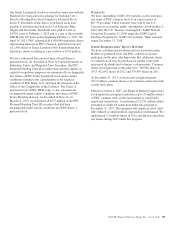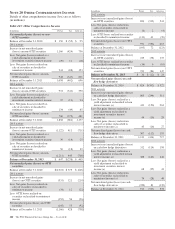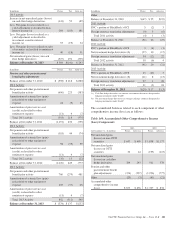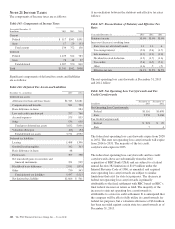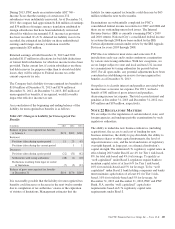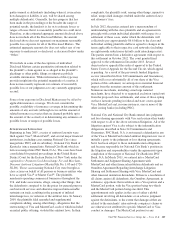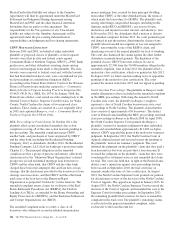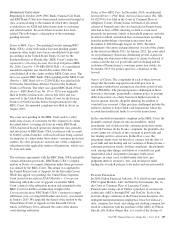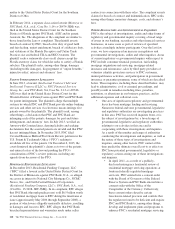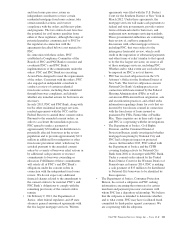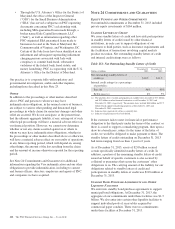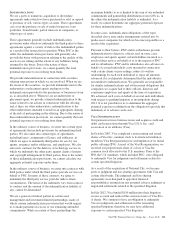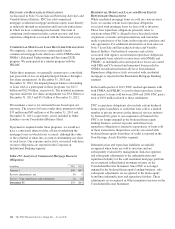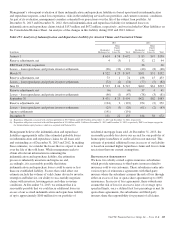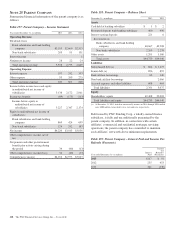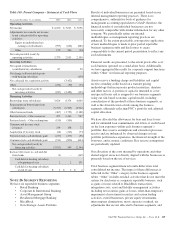PNC Bank 2013 Annual Report Download - page 227
Download and view the complete annual report
Please find page 227 of the 2013 PNC Bank annual report below. You can navigate through the pages in the report by either clicking on the pages listed below, or by using the keyword search tool below to find specific information within the annual report.C
APTIVE
M
ORTGAGE
R
EINSURANCE
L
ITIGATION
In December 2011, a lawsuit (White, et al. v. The PNC
Financial Services Group, Inc., et al. (Civil Action No. 11-
7928)) was filed against PNC (as successor in interest to
National City Corporation and several of its subsidiaries) and
several mortgage insurance companies in the United States
District Court for the Eastern District of Pennsylvania. This
lawsuit, which was brought as a class action, alleges that
National City structured its program of reinsurance of private
mortgage insurance in such a way as to avoid a true transfer of
risk from the mortgage insurers to National City’s captive
reinsurer. The plaintiffs allege that the payments from the
mortgage insurers to the captive reinsurer constitute
kickbacks, referral payments, or unearned fee splits prohibited
under the Real Estate Settlement Procedures Act (RESPA), as
well as common law unjust enrichment. The plaintiffs claim,
among other things, that from the beginning of 2004 until the
end of 2010 National City’s captive reinsurer collected from
the mortgage insurance company defendants at least $219
million as its share of borrowers’ private mortgage insurance
premiums and that its share of paid claims during this period
was approximately $12 million. The plaintiffs seek to certify a
nationwide class of all persons who obtained residential
mortgage loans originated, funded or originated through
correspondent lending by National City or any of its
subsidiaries or affiliates between January 1, 2004 and the
present and, in connection with these mortgage loans,
purchased private mortgage insurance and whose residential
mortgage loans were included within National City’s captive
mortgage reinsurance arrangements. Plaintiffs seek, among
other things, statutory damages under RESPA (which include
treble damages), restitution of reinsurance premiums
collected, disgorgement of profits, and attorneys’ fees. In
August 2012, the district court directed the plaintiffs to file an
amended complaint, which the plaintiffs filed in September
2012. In November 2012, we filed a motion to dismiss the
amended complaint. The court dismissed, without prejudice,
the amended complaint in June 2013 on statute of limitations
grounds. A second amended complaint, in response to the
court’s dismissal order, was filed in July 2013. We filed a
motion to dismiss the second amended complaint, also in July
2013. The court held oral argument on this motion in January
2014. The court has not yet ruled on this motion.
R
ESIDENTIAL
M
ORTGAGE
-B
ACKED
S
ECURITIES
I
NDEMNIFICATION
D
EMANDS
We have received indemnification demands from several
entities sponsoring residential mortgage-backed securities and
their affiliates where purchasers of the securities have brought
litigation against the sponsors and other parties involved in the
securitization transactions. National City Mortgage had sold
whole loans to the sponsors or their affiliates that were
allegedly included in certain of these securitization
transactions. According to the indemnification demands, the
plaintiffs’ claims in these lawsuits are based on alleged
misstatements and omissions in the offering documents for
these transactions. The indemnification demands assert that
agreements governing the sale of these loans or the
securitization transactions to which National City Mortgage is
a party require us to indemnify the sponsors and their affiliates
for losses suffered in connection with these lawsuits. The
parties have settled several of these cases. There has not been
any determination that the parties seeking indemnification
have any liability to the plaintiffs in the other lawsuits and the
amount, if any for which we are responsible in the settled
cases has not been determined.
L
ENDER
P
LACED
I
NSURANCE
L
ITIGATION
In June 2013, a lawsuit (Lauren vs. PNC Bank, N.A., et al,
Case No. 2:13-cv-00762-TFM) was filed in the United States
District Court for the Western District of Pennsylvania against
PNC Bank and American Security Insurance Company
(“ASIC”), a provider of property and casualty insurance to
PNC for certain residential mortgages. This lawsuit, which
was brought as a class action, alleges, with respect to PNC
Bank, that it breached alleged contractual (including the
implied covenant of good faith and fair dealing) and fiduciary
duties to residential mortgage borrowers, and, as to Ohio
borrowers, violated the Ohio Consumer Sales Practice Act in
connection with the administration of PNC Bank’s program
for placement of insurance for borrowers who fail to obtain
hazard insurance coverages required by the terms of their
mortgages. The plaintiff alleges, among other things, that
defendants placed insurance in unnecessary and excessive
amounts and that PNC Bank improperly profited from these
arrangements, principally as a result of the payment of
commissions to PNC Bank and of reinsurance arrangements
between PNC and the insurance provider. The plaintiff
originally sought to certify a nationwide class and an Ohio
sub-class of all persons who, during applicable periods, have
or had a residential mortgage loan or line of credit with PNC
Bank, and had hazard insurance placed upon the property by
PNC Bank. The plaintiff seeks, among other things, damages,
restitution or disgorgement of profits improperly obtained,
injunctive relief, interest, and attorneys’ fees. In October
2013, the court ruled on our motion to dismiss the complaint,
granting our motion with respect to the Ohio Consumer Sales
Practice Act claim and otherwise denying the motion. We
filed a motion seeking reconsideration of the denial as to the
fiduciary duty claim, which motion was denied in November
2013. In January 2014, the court granted ASIC’s motion to
dismiss the nationwide class action allegations with respect to
the state common law claim of unjust enrichment pending
against ASIC. Later in January 2014, PNC Bank filed a
similar motion to dismiss the nationwide class action
allegations, on the same grounds as asserted in ASIC’s motion
to dismiss, with respect to the state common law claims of
breach of contract, breach of the implied covenant of good
faith and fair dealing, and breach of fiduciary duty pending
against PNC Bank. The plaintiff thereafter agreed to withdraw
those allegations. In February 2014, the court entered an order
dismissing the plaintiff’s nationwide class action allegations
with regard to all remaining claims against PNC. Also in
February 2014, the court on its own motion transferred the
The PNC Financial Services Group, Inc. – Form 10-K 209


